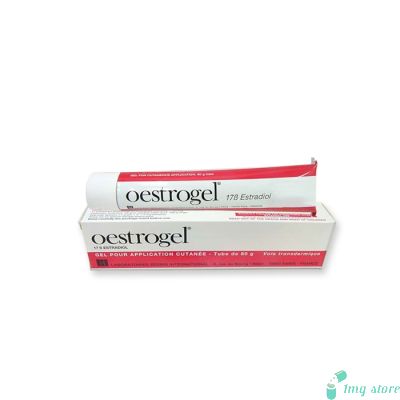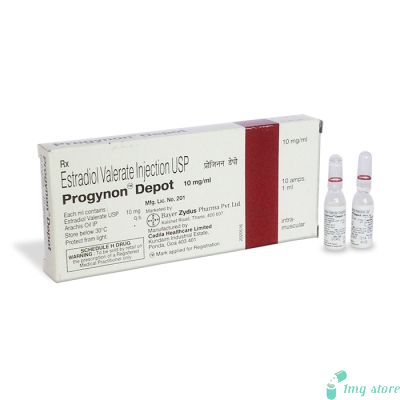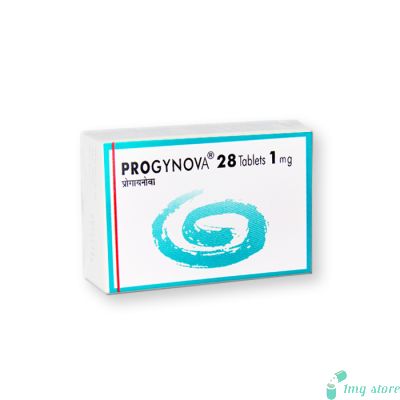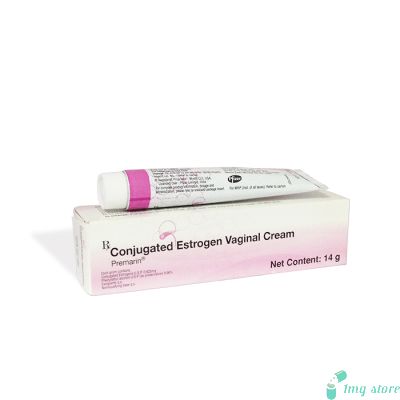Evalon Cream (Estriol)
Estriol cream contains Estriol which belongs to a group of medicines called Hormone Replacement Therapy. Evalon Cream is used to provide relief from menopausal symptoms in women affected with vaginal atrophy (thinning of vaginal walls). Evalon Cream is not recommended for use in patients allergic (hypersensitive) to estriol.
Evalon Cream (Estriol) for Women's Health
Evalon Cream is a topical medication that contains estriol as its active ingredient. Estriol is a type of estrogen hormone that is naturally produced in the female body. It is primarily used to treat symptoms associated with menopause, such as vaginal dryness, itching, and burning. It is also sold under the brand name Estrace Cream.
The cream is applied directly to the vaginal area, where it helps to restore the natural moisture and elasticity of the tissues. Estriol in Evalon Cream works by binding to estrogen receptors in the vaginal lining, stimulating the production of mucus and improving blood flow to the area. This helps to alleviate discomfort and restore vaginal health. Evalon Cream is typically prescribed for women who are experiencing vaginal atrophy, a common condition that occurs due to decreased estrogen levels during menopause. It can also be used for other conditions where vaginal dryness is a concern, such as after childbirth or during breastfeeding. It is important to follow the instructions provided by your healthcare provider when using Evalon Cream. The recommended dosage and duration of treatment may vary depending on your specific condition. It is generally applied once daily, usually at bedtime, using the applicator provided with the cream.
As with any medication, there may be potential side effects associated with the use of Evalon Cream. These can include mild irritation or itching in the vaginal area, breast tenderness, and changes in menstrual bleeding. If you experience any persistent or severe side effects, it is important to consult your healthcare provider. In some countries, estriol cream over the counter may be available without a prescription. However, the availability of estriol cream without a prescription can vary depending on the regulations in your specific location. It is always best to check with your local pharmacy or healthcare provider to determine whether estriol cream is available over the counter in your area.
Overall, Evalon Cream is a topical estrogen cream that is used to treat vaginal dryness and related symptoms. It provides relief by restoring moisture and elasticity to the vaginal tissues, improving overall vaginal health.
Estriol cream benefits when used for appropriate indications. Here are some of the potential benefits of estriol cream:
Vaginal Health: Estriol cream is primarily used to improve vaginal health in women experiencing symptoms of vaginal atrophy or dryness. It helps restore moisture and elasticity to the vaginal tissues, reducing discomfort, itching, and burning sensations.
Menopausal Symptom Relief: Estriol cream can alleviate various menopausal symptoms, including hot flashes, night sweats, and mood swings. By replenishing estrogen levels locally, it can help restore hormonal balance and improve overall well-being.
Urinary Tract Health: Estriol cream may also benefit the urinary tract by reducing symptoms of urinary incontinence and urinary urgency associated with menopause. It strengthens the urethral tissues, improving bladder control and reducing the frequency of urinary tract infections.
Skin Health: Estriol has been found to have moisturizing and anti-aging effects on the skin. Estriol cream can help improve skin elasticity, reduce dryness, and minimize the appearance of fine lines and wrinkles.
Bone Health: Estriol has a positive effect on bone density, and its use may help prevent or slow down bone loss associated with aging. By maintaining bone strength, estriol cream can potentially reduce the risk of fractures and osteoporosis.
Breast Health: Estriol, unlike other estrogens, has a weaker effect on breast tissue. It may be beneficial for women who have a history of breast cancer or are at higher risk, as it is less likely to stimulate breast cell proliferation.
It is important to note that the use of estriol cream should be discussed with a healthcare provider, as individual circumstances and medical history can influence its suitability and dosage. Your healthcare provider can evaluate the potential benefits and risks of estriol cream for your specific situation.
Here are some important points to be noticed while using Evalon Cream (Estriol):
Consultation with a Healthcare Provider: Prior to utilizing estriol cream, it is vital to talk with a medical care supplier, for example, a gynecologist or dermatologist, who can evaluate what is going on and give fitting directions.
Proper Application: Follow the instructions provided with the Estrace Cream for the correct application. Use the recommended amount of cream and apply it as directed to the affected area. Estriol cream for vaginal dryness, an applicator may be provided for precise and controlled application.
Facial Use: Estriol cream for face is primarily designed for vaginal use, and its application on the face should be done with caution. Using estriol cream on the face should only be done under the supervision and recommendation of a qualified healthcare professional, as facial skin is more sensitive and may react differently compared to vaginal tissue.
Hormonal Balance: Estriol cream works by providing local estrogen therapy. It is important to discuss your hormonal balance and any underlying conditions with your healthcare provider to ensure that estriol cream is suitable for you. They can help determine the appropriate dosage and duration of use.
Breast Cancer History: If you have a history of breast cancer or are at an increased risk, it is crucial to discuss the use of estriol cream with your healthcare provider. Estriol has a weaker effect on breast tissue compared to other estrogens, but individual circumstances and medical history should be considered.
Regular Follow-up: Regularly follow up with your healthcare provider to monitor the effects of estriol cream and adjust the treatment as needed. They can evaluate the effectiveness, address any concerns, and make any necessary modifications to your treatment plan.
Estriol cream has various uses, including:
Vaginal Atrophy: Estriol cream is usually used to treat vaginal decay, a condition portrayed by diminishing, dryness, and irritation of the vaginal tissues. It reestablishes dampness, flexibility, and by and large vaginal well-being, mitigating side effects like vaginal dryness, tingling, and uneasiness. Estriol cream can be particularly beneficial for menopausal women experiencing vaginal changes due to decreased estrogen levels.
Menopausal Symptoms: Estriol cream may also help relieve other menopausal symptoms. It can reduce hot flashes, night sweats, mood swings, and sleep disturbances associated with hormonal changes during menopause. Estriol cream provides local estrogen therapy, helping restore hormonal balance in the vaginal area and potentially improving overall well-being.
Urinary Tract Health: Estriol cream can be beneficial for urinary tract health, specifically for women experiencing urinary symptoms related to menopause, such as urinary incontinence, urinary urgency, or recurrent urinary tract infections. Estriol cream strengthens the urethral tissues and can improve bladder control and reduce the frequency of urinary tract infections.
Skin Health: Estriol cream has moisturizing and anti-aging effects on the skin. It can help improve skin elasticity, reduce dryness, and minimize the appearance of fine lines and wrinkles. Estriol cream is sometimes used topically on the face to enhance skin health, but this should be done under the guidance of a healthcare professional.
Bone Health: Estriol has a positive effect on bone density and may help prevent or slow down bone loss associated with aging. By maintaining bone strength, estriol cream can potentially reduce the risk of fractures and osteoporosis. However, other forms of estrogen therapy are usually preferred for systemic bone health benefits.
It is important to note that the specific use of estriol cream should be determined by a healthcare professional based on individual needs and medical history. They can evaluate your symptoms and recommend the appropriate treatment plan for your condition.
Here are some possible side effects associated with the use of estriol cream:
Local Irritation: Mild irritation, itching, or redness at the application site can occur. This is usually temporary and subsides as the body adjusts to the medication. If these symptoms persist or worsen, it is advisable to consult your healthcare provider.
Breast Tenderness: Some women may experience breast tenderness or swelling while using estriol cream. This side effect is typically mild and transient.
Changes in Menstrual Bleeding: Estriol cream may cause changes in menstrual bleeding patterns, such as irregular bleeding or spotting. These changes are generally temporary and tend to resolve with continued use.
Headache: Headaches are a possible side effect, although they are relatively uncommon. If you experience persistent or severe headaches, it is advisable to seek medical advice.
Nausea: In rare cases, estriol cream may cause mild nausea or gastrointestinal discomfort. If you experience persistent or severe nausea, it is important to consult your healthcare provider.
Allergic Reactions: Although rare, some individuals may be allergic to estriol cream or its components. Signs of an allergic reaction may include itching, rash, hives, swelling, or difficulty breathing. If you experience any of these symptoms, seek immediate medical attention.
It is important to note that this is not an exhaustive list of all possible side effects. Some individuals may experience different or additional side effects. If you have any concerns about side effects while using estriol cream, it is recommended to consult your healthcare provider. They can provide personalized guidance based on your specific situation and medical history.
Q: What is estriol cream used for?
A: Estriol cream is primarily used to treat symptoms of vaginal atrophy and dryness associated with menopause. It helps restore moisture and elasticity to the vaginal tissues, reducing discomfort and itching. Estriol cream may also have other uses as prescribed by a healthcare provider.
Q: How do I use estriol cream?
A: Estriol cream is typically applied directly to the vaginal area using the applicator provided. Follow the instructions given by your healthcare provider or the product packaging for the correct dosage and application technique. It is often recommended to apply the cream once daily, usually at bedtime.
Q: Can estriol cream be used on the face?
A: Estriol cream is primarily designed for vaginal use, and its use on the face should only be done under the supervision and recommendation of a qualified healthcare professional. Facial skin is more sensitive, and using estriol cream on the face may have different effects compared to vaginal application.
Q: Can estriol cream be used during pregnancy?
A: Estriol cream is generally not recommended for use during pregnancy unless specifically prescribed by a healthcare provider. It is important to consult with a healthcare professional before using estriol cream or any other medication during pregnancy or while breastfeeding.
Q: How long does it take for estriol cream to work?
A: The time it takes for estriol cream to work can vary depending on the individual and the specific condition being treated. Some women may experience relief from symptoms within a few weeks, while others may require more time. It is important to follow the prescribed treatment duration and consult your healthcare provider if you have concerns.
Here are some common types of drug connections to be aware of:
Estrogen-containing Products: Utilizing Estrace Cream alongside other estrogen-containing items, for example, oral chemical substitution treatment or estrogen-based contraceptives, may increment estrogen levels in the body. This could potentially lead to adverse effects or an increased risk of side effects. Your healthcare provider can help determine the appropriate use of multiple estrogen products.
Other Topical Medications: When using multiple topical medications simultaneously, there is a possibility of interactions. It is important to inform your healthcare provider about any other creams, ointments, or gels you are using to ensure compatibility and minimize the risk of adverse reactions.
Medications that Interfere with Estrogen Metabolism: Some medications can affect the metabolism of estrogen in the body, potentially reducing the effectiveness of estriol cream. These medications include certain enzyme-inducing drugs, such as rifampin, phenytoin, and carbamazepine. Your healthcare provider can advise you on the potential interactions and adjust your treatment plan accordingly.
Blood Thinners: Estriol cream is not known to have significant interactions with blood thinners like warfarin. However, it is still important to inform your healthcare provider if you are taking any blood thinning medications to ensure proper monitoring of your blood clotting parameters.
Herbal Supplements and Over-the-Counter Products: Some herbal supplements and over-the-counter products may interact with estriol cream. St. John's wort, for example, can reduce the effectiveness of estrogens. Always inform your healthcare provider about any supplements or over-the-counter products you are using.
These are just a few examples of potential drug interactions. It is important to consult your healthcare provider or pharmacist to obtain comprehensive information about specific interactions related to your medication regimen. They can provide personalized advice based on your medical history and help ensure the safe and effective use of estriol cream.
| Manufacturer | : | Torrent Pharmaceuticals Ltd |
| Equivalent Brand | : | Estrace Cream |
| Generic Search | : | Estriol |












